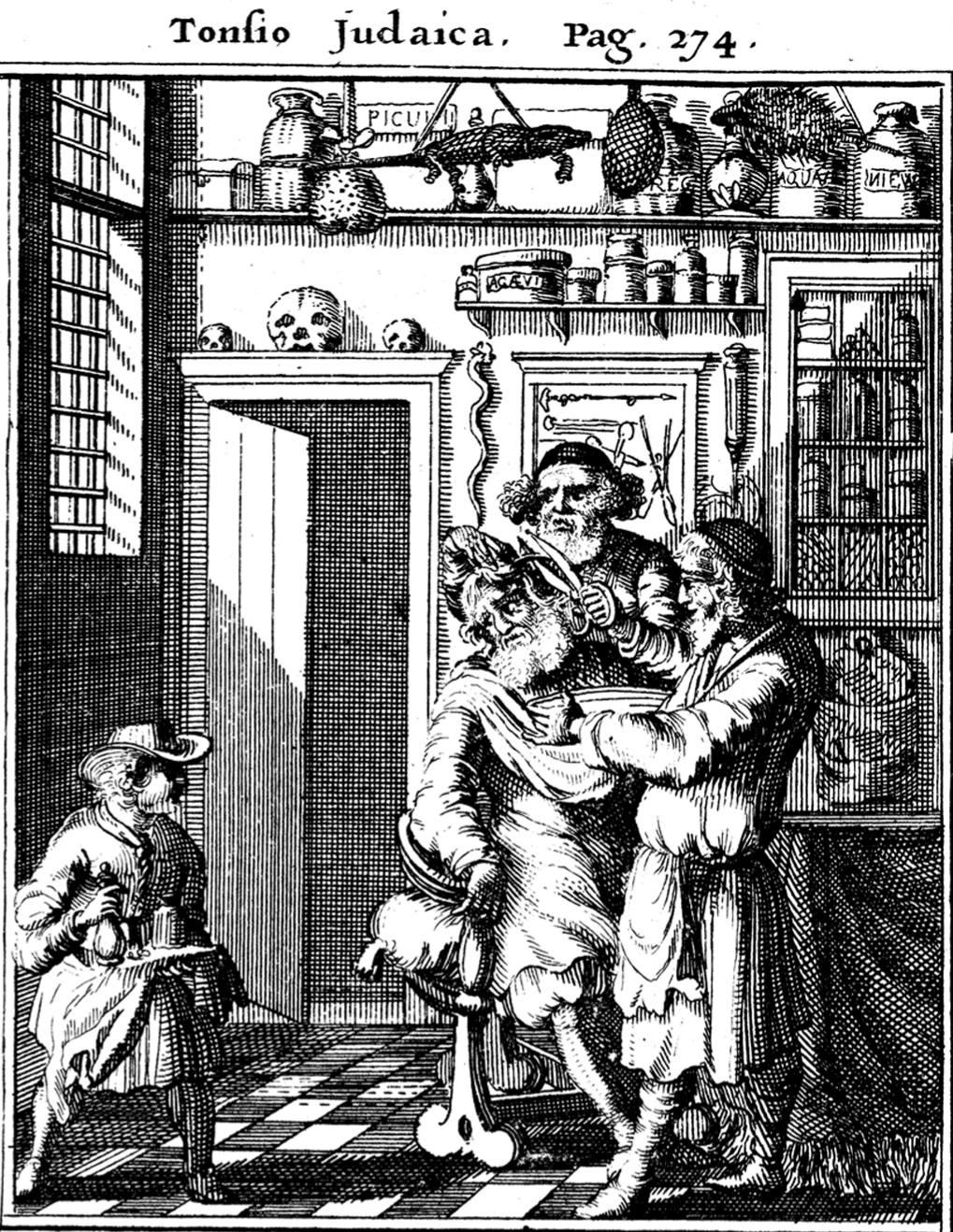|
Yisroel Avrohom Portugal
Rabbi Yisroel Avrohom Portugal (or Israel Abraham Portugal) (June 2, 1923 April 1, 2019) son of Rabbi Eliezer Zusia Portugal, Eliezer Zusia, was the Rebbe (Grand Rabbi) of Skulen (Hasidic dynasty), Skulen in Brooklyn, New York (state), New York. He was the last Holocaust era Rebbe to lead a Hasidic dynasty. Early years, education, and World War II Rabbi Portugal was born June 2 1923 to Eliezer Zusia and his first wife Sheina Rachel in Sculeni, Moldova, a town near the Romanian border. In his youth, he studied in Vyzhnytsia, Vizhnitz under the Vizhnitz (Hasidic dynasty), Vizhnitzer Rebbe, Rabbi Eliezer Hager. Before World War II began, Portugal and his father left their hometown of Sculeni in Moldova (the town from which derives the name of the Hasidic dynasty that they led) and went to Chernowitz in Ukraine, where they spent the Second World War. Soviet occupation Rabbi Portugal and his father, Rabbi Eliezer Zusia Portugal, rescued and cared for more than 300 Jewish children o ... [...More Info...] [...Related Items...] OR: [Wikipedia] [Google] [Baidu] |
Sculeni
Sculeni (, ''Skulen'') is a commune in Ungheni District, Moldova. It is composed of four villages: Blindești, Floreni, Gherman and Sculeni. It is also a border checkpoint to Romania. History The Romanian boyar and heir apparent to the Moldavian throne Grigore Mihail Sturdza was born in Sculeni in 1821. He was the son of Prince Mihail Sturdza, a scion of Wallachian and Moldavian nobility. The town had an important Jewish community before World War II. In June 1941, hundreds of Jews from the area were murdered in mass executions perpetrated by a death squad of Romanian troops. The town is the namesake of the Skulen Hasidic dynasty, as its founder, Eliezer Zusia Portugal, initially served as the town's rabbi. Natives * Grigore Sturdza, boyar (noble), soldier, politician and adventurer * Olga Bogdanova, actress * Andrei Eșanu, historian * Wincenty (Morari), metropolitan * Eliezer Zusia Portugal, rabbi * Yisroel Avrohom Portugal, rabbi Gallery File:AlexanderYpsila ... [...More Info...] [...Related Items...] OR: [Wikipedia] [Google] [Baidu] |
Borough Park, Brooklyn
Borough Park (also spelled Boro Park) is a neighborhood in the southwestern part of the borough (New York City), borough of Brooklyn, in New York City. The neighborhood is bordered by Bensonhurst, Brooklyn, Bensonhurst to the south, Dyker Heights, Brooklyn, Dyker Heights to the southwest, Sunset Park, Brooklyn, Sunset Park to the west, Kensington, Brooklyn, Kensington and Green-Wood Cemetery to the northeast, Flatbush, Brooklyn, Flatbush to the east, and Mapleton, Brooklyn, Mapleton to the southeast. It is economically diverse and home to one of the largest Orthodox Judaism, Orthodox Jewish communities outside Israel, with one of the largest concentrations of Jews in the United States. With Orthodox and Haredi families having an average of 6.72 children, Boro Park is experiencing a sharp growth in population. The neighborhood is part of Brooklyn Community Board 12, Brooklyn Community District 12, and its primary ZIP Code is 11219. It is patrolled by the 66th Precinct of the New ... [...More Info...] [...Related Items...] OR: [Wikipedia] [Google] [Baidu] |
Peyos
Sidelocks in English, or ''pe'ot'' in Hebrew, anglicized as payot (, "corners") or payes (), is the Hebrew term for sidelocks or sideburns. Payot are worn by some men and boys in the Orthodox Jewish community based on an interpretation of the Tanakh's injunction against shaving the "sides" of one's head. Literally, ''pe'a'' means "corner, side, edge". There are different styles of payot among Haredi or Hasidic, Yemenite, and Chardal Jews. Yemenite Jews call their sidelocks ''simanim'' (), literally, "signs", because their long-curled sidelocks served as a distinguishing feature in Yemenite society (differentiating them from their Gentile neighbors). Rabbinic interpretation Reason According to Maimonides, shaving the sidelocks was a heathen practice. Specifics The Torah says, "you shall not round off the ''pe'a'' of your head ()". The word ''pe'a'' was taken to mean the hair in front of the ears extending to beneath the cheekbone, on a level with the nose (Talmud – Makkot 20a) ... [...More Info...] [...Related Items...] OR: [Wikipedia] [Google] [Baidu] |
Israel
Israel, officially the State of Israel, is a country in West Asia. It Borders of Israel, shares borders with Lebanon to the north, Syria to the north-east, Jordan to the east, Egypt to the south-west, and the Mediterranean Sea to the west. Israeli-occupied territories, It occupies the Occupied Palestinian territories, Palestinian territories of the West Bank in the east and the Gaza Strip in the south-west. Israel also has a small coastline on the Red Sea at its southernmost point, and part of the Dead Sea lies along its eastern border. Status of Jerusalem, Its proclaimed capital is Jerusalem, while Tel Aviv is the country's Gush Dan, largest urban area and Economy of Israel, economic center. Israel is located in a region known as the Land of Israel, synonymous with the Palestine (region), Palestine region, the Holy Land, and Canaan. In antiquity, it was home to the Canaanite civilisation followed by the History of ancient Israel and Judah, kingdoms of Israel and Judah. Situate ... [...More Info...] [...Related Items...] OR: [Wikipedia] [Google] [Baidu] |
Tzedakah
''Tzedakah'' ( ''ṣədāqā'', ) is a Hebrew word meaning "righteousness", but commonly used to signify ''charity''. This concept of "charity" differs from the modern Western understanding of "charity". The latter is typically understood as a spontaneous act of goodwill and a marker of generosity; ''tzedakah'' is an ethical obligation, and it is not properly "charity", like in Christendom, but a way to empower poor people to support themselves, helping them in developing their talents and skills. ''Tzedakah'' (Tzedaka) refers to the religious obligation to do what is right and just, which Judaism emphasizes as an important part of living a spiritual life. Unlike voluntary philanthropy, ''tzedakah'' is seen as a religious obligation that must be performed regardless of one's financial standing, and so is mandatory even for those of limited financial means. ''Tzedakah'' is considered to be one of the three main acts that can positively influence an unfavorable heavenly decree ... [...More Info...] [...Related Items...] OR: [Wikipedia] [Google] [Baidu] |
Rebbe
A Rebbe () or Admor () is the spiritual leader in the Hasidic movement, and the personalities of its dynasties.Heilman, Samuel"The Rebbe and the Resurgence of Orthodox Judaism."''Religion and Spirituality (Audio)''. UCTV, 20 Oct 2011. web. 31 Jul 2013. The titles of Rebbe and Admor, which used to be a general honorific even before the beginning of the movement, became, over time, almost exclusively identified with its Tzadikim. Usage Today, ''rebbe'' is used in the following ways: # Rabbi, a teacher of Torah: Yeshiva students or '' cheder'' (elementary school) students, when talking to their teacher, would address him with the honorific ''Rebbe'', as the Yiddish-German equivalent to the Hebrew word ''rabbi'' ( ' ). # Personal mentor and teacher: A person's main Rosh Yeshiva, Yeshiva teacher, or mentor, who teaches him or her Talmud and Torah and gives religious guidance, is referred to as ''rebbe'' (),''Oxford Dictionary of English'', ''Merriam-Webster's Collegiate Dictio ... [...More Info...] [...Related Items...] OR: [Wikipedia] [Google] [Baidu] |
Tish (Hasidic Celebration)
A Tish, also ''tische'' (, ) is a Shabbat or holiday gathering for Hasidic Jews around their Rabbi or " Rebbe". In Chabad, a tische is called (). It may consist of speeches on Torah subjects, singing of melodies known as (singular ) and ("hymns"), with refreshments being served. Hasidim see it as a moment of great holiness. Within Hasidic Judaism, a refers to any joyous public celebration or gathering or meal by Hasidim at a "table" of their Rebbe. Such a gathering is staged around the blessing of Melchizedek-themed "setting of the table" and so is often referred to in Hebrew as (). Bread and wine are essential elements. Overview During a ''tische'', the Rebbe sits at the head of the table and the Hasidim gather around the table. In large Hasidic movements, only the Rebbe and his immediate family, plus a few close disciples, partake of the actual meal, but small pieces of bread, fish, meat, poultry, farfel, beans, kugel, cake or fruit, as well as small cups of w ... [...More Info...] [...Related Items...] OR: [Wikipedia] [Google] [Baidu] |
Tape Recorder
An audio tape recorder, also known as a tape deck, tape player or tape machine or simply a tape recorder, is a sound recording and reproduction device that records and plays back sounds usually using magnetic tape for storage. In its present-day form, it records a fluctuating signal by moving the tape across a tape head that polarizes the magnetic domains in the tape in proportion to the audio signal. Tape-recording devices include the reel-to-reel tape deck and the cassette deck, which uses a cassette tape (format), cassette for storage. The use of magnetic tape for sound recording originated around 1930 in Germany as paper tape with oxide lacquered to it. Prior to the development of magnetic tape, magnetic wire recording, wire recorders had successfully demonstrated the concept of magnetic recording, but they never offered audio quality comparable to the other recording and broadcast standards of the time. This German invention was the start of a long string of innovations ... [...More Info...] [...Related Items...] OR: [Wikipedia] [Google] [Baidu] |
Shabbat
Shabbat (, , or ; , , ) or the Sabbath (), also called Shabbos (, ) by Ashkenazi Hebrew, Ashkenazim, is Judaism's day of rest on the seventh day of the seven-day week, week—i.e., Friday prayer, Friday–Saturday. On this day, religious Jews remember the biblical stories describing the Genesis creation narrative, creation of the heaven and earth in six days and the redemption from slavery and the Exodus from Egypt. Since the Hebrew calendar, Jewish religious calendar counts days from sunset to sunset, Shabbat begins in the evening of what on the civil calendar is Friday. Shabbat observance entails refraining from 39 Melachot, work activities, often with shomer Shabbat, great rigor, and engaging in restful activities to honor the day. Judaism's traditional position is that the unbroken seventh-day Shabbat originated among the Jewish people, as their first and most sacred institution. Variations upon Shabbat are widespread in Judaism and, with adaptations, throughout the Abraham ... [...More Info...] [...Related Items...] OR: [Wikipedia] [Google] [Baidu] |





